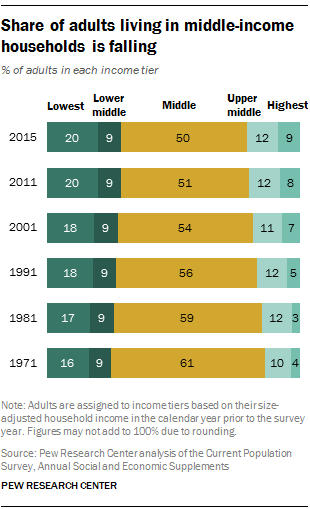Middle Class Hollowing-Out Trend
(Redirected from Middle-Income Household Hollowing-Out)
Jump to navigation
Jump to search
A Middle Class Hollowing-Out Trend is Societal Trend for a decline in middle-class household proportions.
- Context:
- It can be the result of Job Polarization.
- Example(s):
- as for U.S. Middle-Class Households since the 1970s.
- Example(s):
- See: Middle Class, Technological Unemployment, Economic Inequality.
References
2015
- https://www.pewsocialtrends.org/2015/12/09/the-american-middle-class-is-losing-ground/
- QUOTE: ... The hollowing of the American middle class has proceeded steadily for more than four decades. Since 1971, each decade has ended with a smaller share of adults living in middle-income households than at the beginning of the decade, and no single decade stands out as having triggered or hastened the decline in the middle. Based on the definition used in this report, the share of American adults living in middle-income households has fallen from 61% in 1971 to 50% in 2015. ...
 ... This report uses household income to group people. For that reason, the term “middle income” is used more often than not. However, “middle class” is also used at times for the sake of exposition.
... This report uses household income to group people. For that reason, the term “middle income” is used more often than not. However, “middle class” is also used at times for the sake of exposition.
- QUOTE: ... The hollowing of the American middle class has proceeded steadily for more than four decades. Since 1971, each decade has ended with a smaller share of adults living in middle-income households than at the beginning of the decade, and no single decade stands out as having triggered or hastened the decline in the middle. Based on the definition used in this report, the share of American adults living in middle-income households has fallen from 61% in 1971 to 50% in 2015. ...
2013
- (Condon & Wiseman, 2013) ⇒ Bernard Condon, and Paul Wiseman. (2013). “AP IMPACT: Recession, tech kill middle-class jobs.” In: Associated Press – Wed, Jan 23, 2013
- Occupations that provided middle-class lifestyles for generations can disappear in a few years. Utility meter readers are just one example. As power companies began installing so-called smart readers outside homes, the number of meter readers in the U.S. plunged from 56,000 in 2001 to 36,000 in 2010, according to the Labor Department. In 10 years? That number is expected to be zero.
2009
- (Carr & Kefalas, 2009) ⇒ Patrick J. Carr, and Maria J. Kefalas. (2009). “Hollowing Out the Middle: The Rural Brain Drain and What It Means for America." Beacon Press. ISBN: 0807006149
- BOOK OVERVIEW: In 2001, with funding from the MacArthur Foundation, sociologists Patrick J. Carr and Maria J. Kefalas moved to Iowa to understand the rural brain drain and the exodus of young people from America’s countryside. They met and followed working-class “stayers”; ambitious and college-bound “achievers”; “seekers,” who head off to war to see what the world beyond offers; and “returners,” who eventually circle back to their hometowns. What surprised them most was that adults in the community were playing a pivotal part in the town’s decline by pushing the best and brightest young people to leave.
In a timely, new afterword, Carr and Kefalas address the question “so what can be done to save our communities?” They profile the efforts of dedicated community leaders actively resisting the hollowing out of Middle America. These individuals have creatively engaged small town youth — stayers and returners, seekers and achievers — and have implemented a variety of programs to combat the rural brain drain. These stories of civic engagement will certainly inspire and encourage readers struggling to defend their communities.
- BOOK OVERVIEW: In 2001, with funding from the MacArthur Foundation, sociologists Patrick J. Carr and Maria J. Kefalas moved to Iowa to understand the rural brain drain and the exodus of young people from America’s countryside. They met and followed working-class “stayers”; ambitious and college-bound “achievers”; “seekers,” who head off to war to see what the world beyond offers; and “returners,” who eventually circle back to their hometowns. What surprised them most was that adults in the community were playing a pivotal part in the town’s decline by pushing the best and brightest young people to leave.
2000
- (Sullivan et al., 2000) ⇒ Teresa A Sullivan, Elizabeth Warren, and Jay Lawrence Westbrook. (2000). “The Fragile Middle Class: Americans in Debt." Yale University Press. ISBN:0300091710
- QUOTE: … the authors discover that financial stability for many middle-class Americans is all too fragile. The authors consider the changing cultural & economic factors that threaten financial security & what they imply for the future vitality of the middle class.